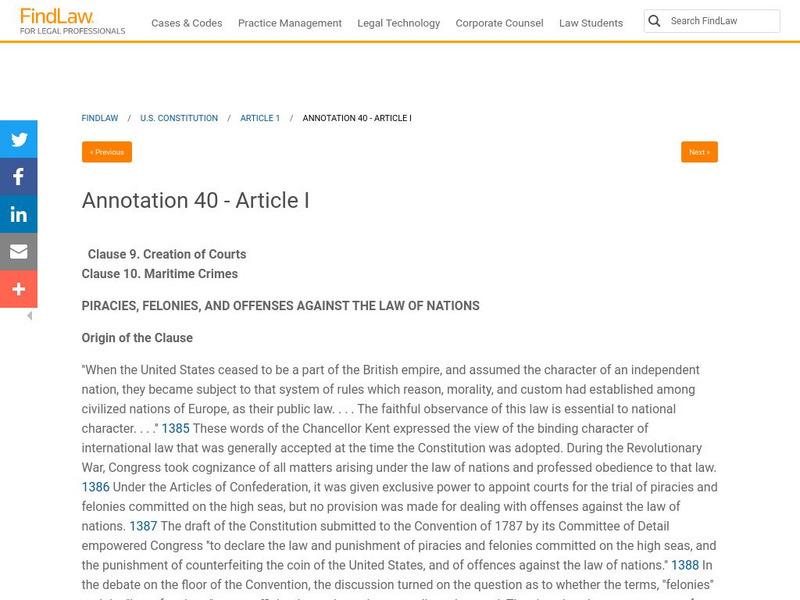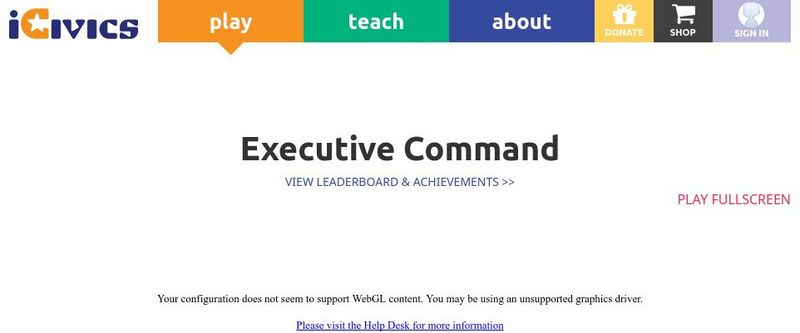University of Groningen
American History: Outlines: Little Legislatures
This site from the University of Groningen clearly defines the role of committees in the legislative process, as well as a brief historical perspective on congressional committees. Essays, text and biography links related to American...
US Government Publishing Office
Ben's Guide to u.s. Government: Learning Adventures: How Laws Are Made: The Language of the Law
Learning Adventures from Bensguide summarizes the process of lawmaking outlined in the U.S. Constitution and provides links to a glossary of legislative terms and Congressional Resolution from 2003.
Constitutional Rights Foundation
Constitutional Rights Foundation: Mc Culloch v. Maryland (1819): John Marshall and the Bank Case [Pdf]
Lesson on Supreme Court Landmark case in which students analyze the constitutional argument and significance of McCulloch v. Maryland and further analyze and interpret implied constitutional powers of Congress through writing, discussion...
US Government Publishing Office
Ben's Guide to u.s. Government: The President of the United States (9 12)
Summarizes the role of the President as the Head of the Executive Branch and the powers and duties assigned to him by the Constitution. Provides links to further information.
American Bar Association
American Bar Assoc.: Separation of Powers, Connecting the Separate Powers [Pdf]
This lesson involves role-playing to help the students understand the separation of powers. [PDF]
US National Archives
National Archives: What Congress Does and Why It Matters
Students will analyze primary sources related to Congress to learn the specific powers of the Legislative Branch. Included is a chart to download and print, worksheets, materials, and an answer key. Primary sources to be examined are...
US National Archives
National Archives: Congress at Work: Presidential Veto
The veto process is an integral part of our checks and balances. Introduce the power of the presidential veto and override to a class using an example from President Nixon's administration. Materials include the Constitution, worksheets,...
US National Archives
National Archives: Congress's First Declaration of War Under the Constitution
The War of 1812 was the first war in which Congress used its power of declaring war. Using primary sources such as the Constitution and the War Manifesto of June 3, 1812, students will understand why and how Congress decided to declare...
US National Archives
National Archives: Representing Congress: Clifford Berryman's Political Cartoons
Political cartoons have informed the public and sparked debate throughout history. This ebook contains political cartoons pertaining to Congress. Students will understand the powers and responsibilities of Congress by analyzing these...
US National Archives
National Archives: Teaching Six Big Ideas in the Constitution
The Constitution can be broken down into 6 main themes: Limited Government, Federalism, Republicanism, Separation of Powers, Checks and Balances, and Popular Sovereignty. Students will study background on the Founding Fathers and use...
University of Groningen
American History: Outlines: Congress Oversight Power
This excellent site from the University of Groningen provides a clear overview of the oversight function of Congress. Related American History links include text, essay, and biographical resources.
Tour Costa Rica
Costa Rica Government: Overview
This site gives an overview on the government of Costa Rica. Includes information on the courts, executive and legislative powers, and the provinces of Costa Rica.
Yale University
Article I of the u.s. Constitution
Read all ten sections of Article I of the Constitution, which lay out the powers of the legislative branch of the federal government.
Harry S. Truman Library and Museum
Harry S. Truman Library & Museum: Three Branches of Government
Interactive teaching unit for Grades 5-8 that helps to explain the three branches of government and the the balance of power. Topics covered include balance of government, how a bill becomes a law, the amendment process, the Legislative...
Other
President Gerald Ford's Veto of Railroad Retirement
Text of the message that President Ford wrote to the House of Representatives in 1974 stating his reasons for his veto of the Railroad Retirement Benefits Legislation.
Internal Revenue Service
Irs: How Taxes Evolve? Lesson Plan
This lesson plan will help students understand that the legislative process of enacting federal income tax laws involves formal procedures based on the Constitution and informal procedures that blend and balance various interests.
The White House
The White House: Our Government
Overviews of the major elements of U.S. government, compiled and published by the White House: three branches of the federal government (executive, legislative, judicial), the Constitution, federal agencies and commissions, elections and...
Thomson Reuters
Find Law: Piracies, Felonies, and Offenses Against the Law
This resource explains Clause 10 of Article I of the U.S. Constitution beginning with the origins of "Piracies, Felonies, and Offenses Against the Law of Nations." Further historical background as considered by the Constitutional...
iCivics
I Civics: Mini Lesson: Executive Orders
Students discover how presidents use executive orders to wield power and how the legislative and judicial branches support and challenge these measures.
Woodrow Wilson International Center for Scholars
Wwics: Congressional Oversight: Rules of the Road Less Traveled
This extremely well-written article is a thorough description of the powers, responsibilities and inherent problems of the current congressional oversight system. It is easily read and well organized. (Oct. 24, 2004)
US National Archives
Our Documents: Tennessee Valley Authority Act (1933)
An actual interactive copy of the original Tennessee Valley Authority Act that created cheap power in the Tennessee Valley. Links to larger images, a typed transcript, and a downloadable .PDF file are included on this site. Make sure to...
iCivics
I Civics: Voting in Congress
n this lesson, students learn what factors members of Congress consider when deciding whether to vote for a bill, including the powers given to Congress by the Constitution, what a member's constituents want, his or her political party's...
iCivics
I Civics: Games: Executive Command
Have you ever thought about being president? Executive Command gives you four years in office to accomplish your legislative and policy goals. You'll make a state-of-the-union address, work with your aides and cabinet, try your hand at...
US Senate
The United States Senate
The official site of the United States Senate. Offers many resources for study of current and historical legislation. Also provides forms to contact your senator.









